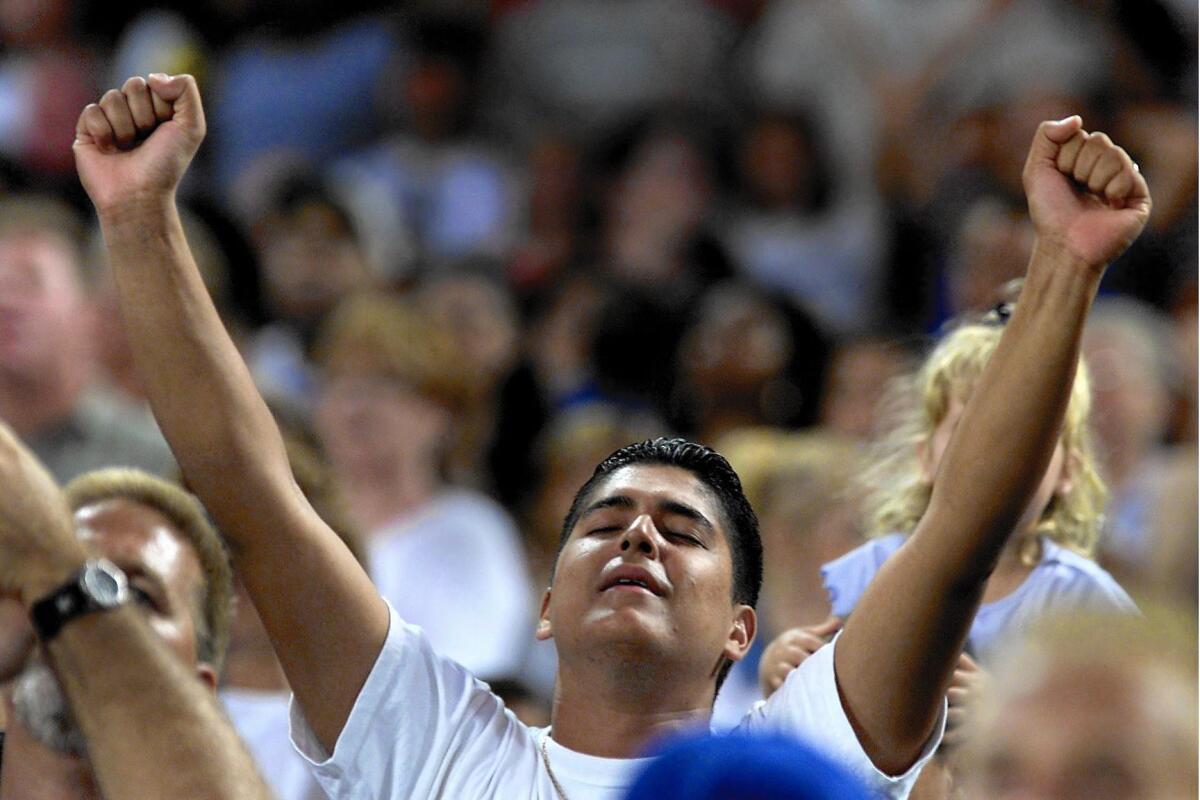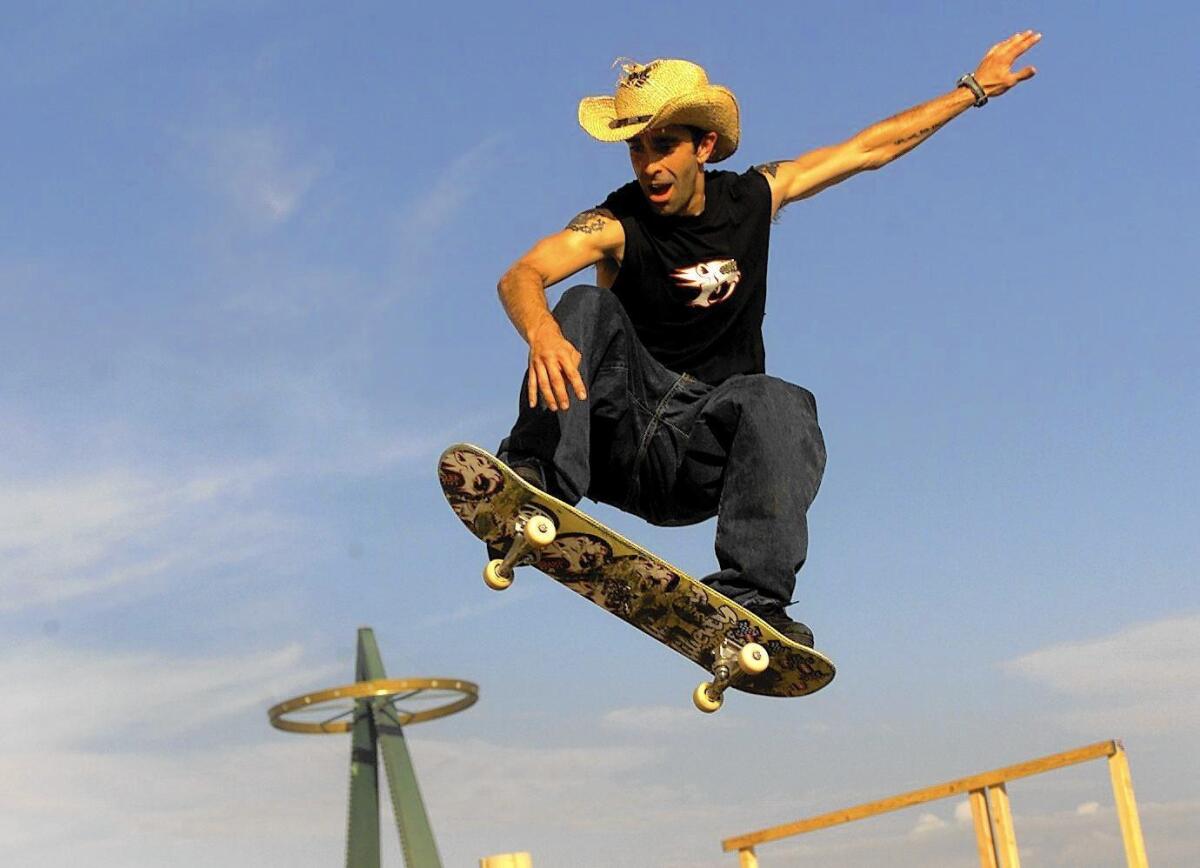‘A delivery boy’ for God: Greg Laurie and his Harvest Crusade are back for a 27th year
Greg Laurie’s first job was as a newspaper delivery boy for the Daily Pilot.
“I had my little Stingray bicycle with the stick shift on it,” he said. “My job was not to write the news, it was not to make the news — it was to deliver the news.”
In the decades since, the 63-year-old pastor of Harvest Orange County, a non-denominational, evangelical church in Irvine, says not much has changed. But instead of the daily news, today he’s delivering the “good news” — the literal translation of the word “gospel,” or the story of Jesus’ life and teachings in the New Testament.
“I’m effectively the same thing,” he said. “I’m a delivery boy. I don’t write the gospel. I just convey it. I’m here to tell people the good news. You learn as a paper boy how to clear hedges, sideway throws, that kind of thing. My job was to get it on their doorstep, and they could decide what to do with it.”
That is how Laurie approaches his annual Harvest Crusade, considered one of the largest evangelical outreach events in the world, though his delivery methods today are more interesting. Laurie, who has no traditional theological training, is known for his simple and relatable preaching style that quotes movie stars and pop psychology studies more than theological writings or church doctrine — in a concert-like atmosphere.
By using humor and a stripped-down theology of Jesus’ salvation, he hopes to satisfy the faithful while appealing to the growing number of non-believers in the country.
At last year’s Harvest Crusade, for example, Laurie took to a stage on the infield of Angel Stadium in Anaheim wearing a black polo shirt and jeans as a giant television screen broadcast his face to the 30,000 people packed into the stands. He spoke on finding happiness by quoting comedian Jim Carrey, joking about Botox and referencing a Time magazine article in between offering Bible verses in what sounded more like a secular motivational speech than a traditional church sermon.

This year, nearly 100,000 people are expected to attend the 27th annual Harvest Crusade — known now as SoCal Harvest — at Angel Stadium from Aug. 26 to 28. In addition to Laurie’s preaching on topics such as the meaning of life and what happens after death, the free public event will feature popular Christian musicians such as Chris Tomlin, TobyMac, KB and Phil Wickham in a large-scale production designed to entertain.
“This is something that’s been going on with evangelicals as far back as when they first emerged,” said Richard Flory, senior director of research and evaluation at the University of Southern California’s Center for Religion and Civic Culture.
“They’re really good at contextualizing what they do religiously within the larger culture. Greg Laurie, the type of music he has, the kinds of events he has, he does it to appeal to the people of today.”
But if his style isn’t unique, Laurie’s enduring ability to draw huge crowds is a striking feat considering the Harvest Crusade’s location far outside the Bible Belt and in a state that Pew Research Center has categorized as one of the least religious in the country.
“To my understanding, there’s no precedent for what we’re doing,” said Laurie, “having a large-scale evangelistic event in the same place for 27 years.”
***
Laurie, a Long Beach native, comes from what he calls a “broken home.” He was raised by his mother, who he describes as a “raging alcoholic” who was “married and divorced seven times.”
“I had no background in the church or Christianity,” he said.
At age 17, he became Christian through the Jesus movement, a wave of religious fervor in Southern California that emerged as a direct response to the counterculture of the 1960s.
At the forefront was Chuck Smith, a pastor who founded the Calvary Chapel in Costa Mesa in 1965.
“He [Smith] appealed to young people through music,” said Eileen Luhr, associate professor of history at Cal State Long Beach and author of “Witnessing Suburbia: Christian Conservatives, ‘Family Values,’ and the Cultural Politics of Youth.” “Not by making them lose their cultural markers when they came into the church, but by accentuating them instead. They turned Jesus into a countercultural figure.”
Smith put a 19-year-old Laurie in charge of a small Bible study in Riverside, and from this, Laurie built Harvest Christian Fellowship in Riverside into a congregation of more than 15,000 that has become one of the largest mega-churches in the country. It now includes the Harvest Orange County “campus” in Irvine.
In 1990, two decades after he began his ministry, Laurie and Smith put on the first Harvest Crusade in Orange County, an event that they hoped would draw those who weren’t already packing the church every Sunday. They instructed churchgoers to bring their non-Christian friends, family and co-workers to the event.
“Most church services are designed for worship, Bible study or spiritual growth,” Laurie said. “We wanted to do an event that was designed, beginning to end, for a nonbeliever, so we could present what it is to be a Christian, who Jesus is, what he said, and how to come into a relationship with him.”
The first Harvest Crusade was a hit.
Laurie filled Costa Mesa’s Pacific Amphitheater for five consecutive nights, and in the next couple of years, he moved the event to Angel Stadium in Anaheim to bring in an even bigger crowd. While Laurie planned the Crusade as an event for nonbelievers, in reality, the majority of attendees were and continue to be Christians looking for a good time.
“It’s like a big Christian party for some people,” said Laurie, who lives in Newport Beach and serves as a chaplain with the Newport Beach Police Department.
The Harvest Crusade was modeled after evangelist Billy Graham’s crusades of the mid-20th century, which also married popular culture with an easy-to-understand religious message.
So instead of a traditional church choir, Laurie brought in popular Christian bands to lead the worship — “almost like what you would see on The Tonight Show,” he said — and he declined to weigh down his sermons with dense theological vocabulary.
USC’s Flory also pointed to exhibitions such as Motocross motorcycle racing, which was featured one year.
“To me, that was representative of a larger trend with evangelicals,” said Flory, who wrote about the Harvest Crusade in his book, “Finding Faith: The Spiritual Quest of the Post-Boomer Generation.” “They’re really good at looking outside the church walls, understanding what’s going on in the culture, finding what appeals to people and sacralizing it and bringing it back to the church.”

In the 26 years since its founding, the Harvest Crusade has attracted more than 5.6 million people — this includes spin-off events outside of Orange County — and an additional 1.8 million have watched online.
But even with the live bands, flashing lights and jumbotron, Laurie takes his message about Jesus seriously, evaluating the success of the Harvest Crusade through the metric of “professions of faith.”
At the end of each Harvest Crusade, Laurie extends an invitation to faith to nonbelievers, and those who have discovered a new faith in Jesus Christ get up from their stadium seats and walk onto the field. According to Laurie, Harvest Crusades have resulted in nearly 500,000 professions of faith over the years — about 10% of all live attendees.
Laurie distinguishes between professions of faith and conversions but has no way to measure how many follow through with a long-term commitment to Christianity.
***
The ongoing success of the Harvest Crusade defies broader religious trends throughout the country.
According to the Pew Research Center, one-fifth of Americans and one-third of adults under 30 are religiously unaffiliated. This percentage of “nones,” as many now call them, has more than doubled since Laurie’s conversion during the Jesus Movement and is the highest in Pew polling history.
At the same time, the number of Christians and their share of the U.S. population is declining.
While these religious shifts seemingly haven’t affected attendance at Laurie’s churches or the Harvest Crusade, it has affected the way he delivers his message.
“I was a none before there were nones,” he said. “So I understand the mentality, and I think of them when I speak. I try to break it down for them. People are so much more biblically illiterate today than when I started preaching over 40 years ago. When I started I could at least assume that when I said ‘Adam and the garden’ or ‘Noah and the ark,’ they’d know that. Today they know nothing about it.”
That Laurie’s sermons are filled with pop culture references and easy-to-understand religious lingo, so that anyone can follow along, reflects an evangelical style of preaching that is the result of suburban pastors having to compete for congregants who may be turned off by complicated theological discussions, said Luhr.
“The ministers are saying, ‘What do people want to hear?’” Luhr said. “It doesn’t emphasize deep, intellectual, scholarly engagement. They have a message that resonates in contrast to mainline churches, where pastors may have a lot of theological training.”
For many, the simple approach is the appeal.
Newport Coast residents Janet and Kevin Huang attended their first Harvest Crusade in 2000, and said it was Laurie’s straightforward message that inspired them to make a public profession of faith and, eventually, to devote themselves to the church.
“It was simple. It wasn’t so that you feel like it’s going over your head,” said Janet Huang. “That was completely different from when I grew up, where you wore your Sunday best and weren’t allowed to let your hair down. This was like, ‘Oh, we can have a good time and be good Christians.’”
Another notable aspect of Laurie’s preaching is the absence of explicit politics and culture wars rhetoric.
While pastors like Jerry Falwell and Pat Robertson brought evangelicals into politics, Flory explained that throughout most of American history, evangelicals have shied away from doing so.
“Salvation through Jesus Christ is his antidote, his answer to racial strife, global unrest and everything,” Flory said of Laurie. “And that’s the answer, other than the politically charged religious right, for all evangelicals. The only way change happens is through Jesus, not through politics.
“But that’s a political statement in itself — a conservative, Republican-oriented statement.”
Laurie said that he’ll spend the three nights of this year’s Harvest Crusade discussing Jesus’ love for everyone, the big questions in life — why am I here, what is the meaning of life, why am I so empty inside and what happens after I die — and the Jesus revolution.
“A sower would throw his seed and the wind would pick it up,” he said, referencing the biblical Parable of the Sower. “Some would fall on the roadside, some would fall on the ground with the weeds, some would fall on the ground that had rocks on it. But some of the seed fell on good ground.
“That’s effectively what we do,” Laurie said of his message. “We throw it out there even though I don’t always know where it’s going to go.”
More to Read
Sign up for Essential California
The most important California stories and recommendations in your inbox every morning.
You may occasionally receive promotional content from the Los Angeles Times.











